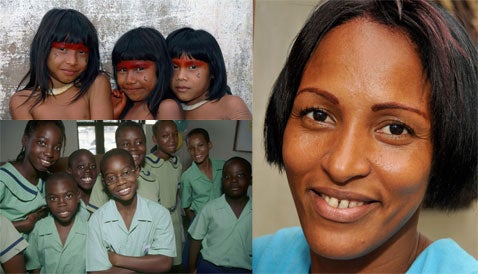

The Pan American Health Organization/World Health Organization (PAHO/WHO) promotes an intercultural approach in the region's health services to integrate traditional knowledge and practices and ensure that all ethnic and racial groups can access the care that they need, in order to improve the health of indigenous, afro-descendant and ethnic/racial populations.
On International Day for the Elimination of Racial Discrimination, PAHO/WHO reminds us that ethnic and racial groups in the Americas still face challenges to their health
Washington, D.C., 20 March 2014 (PAHO/WHO)- The Pan American Health Organization/World Health Organization (PAHO/WHO) promotes an intercultural approach in the region's health services to integrate traditional knowledge and practices and ensure that all ethnic and racial groups can access the care that they need, in order to improve the health of indigenous, afro-descendant and ethnic/racial populations.
 Indigenous and afro-descendant populations, among others, face more difficulties in accessing health services in different countries of the Americas, which has an impact on their overall health, as shown by country data. According to the latest census data from 19 countries of the Americas, the indigenous population accounts for 40 to 50 million people, and the afro-descendants population is estimated at 150 million.
Indigenous and afro-descendant populations, among others, face more difficulties in accessing health services in different countries of the Americas, which has an impact on their overall health, as shown by country data. According to the latest census data from 19 countries of the Americas, the indigenous population accounts for 40 to 50 million people, and the afro-descendants population is estimated at 150 million.
Infant mortality and maternal mortality tend to be higher among indigenous populations and afro-descendants, according to available country data. For example, in Panama the infant mortality rate in indigenous populations was three times higher than that of the rest of population. In the United States, infant mortality in African Americans was 2.5 times higher than that of white Americans. In Brazil, the leading cause of death in indigenous boys and girls under 1 was infectious diseases, while in people of African descent it was extreme prematurity.
"Ample evidence exists of the disadvantages and reduced access that the men, and especially the women and children, of indigenous, afro-descendant and other ethnic/racial groups experience with respect to their health," stated Gina Tambini, director of the Department of Family, Gender and Life Course, upon commemorating the International Day for the Elimination for Racial Discrimination. "At PAHO/WHO we are working with countries for greater inclusion and more participation of these groups that respects their views and improves their health conditions," Tambini emphasized.
In this regard, PAHO/WHO works with countries to incorporate norms so that health services can be culturally adequate with staff trained to understand and help give continuity to their health care. Furthermore, it promotes inter-sectoral actions in order to strengthen health policies directed at these populations. It also tries to improve information on the health of indigenous populations, afro-descendants, and ethnic/racial groups in order to facilitate the adoption of policies that improve their health.
International Day for the Elimination of Racial Discrimination, which is held every 21 March, acknowledges the collective responsibility of promoting and protecting the ideals of the Universal Declaration of Human Rights, whose first article states that "all human beings are born free and equal in dignity and rights."
PAHO, founded in 1902, is the oldest international public health organization in the world. It works with its member countries to improve the health and the quality of life of the people of the Americas. It also serves as the Regional Office for the Americas of WHO and is part of the Inter-American system.
Links:



